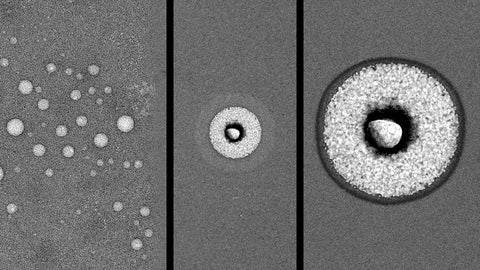Does Liposomal Glutathione Need To Be Refrigerated?

Key Takeaways
-
Should You Refrigerate Liposomal Glutathione?
Refrigeration helps it last longer and stay effective, but some brands stay stable at room temperature. Always check the label for storage instructions. -
What Happens if It’s Stored Wrong?
Heat, light, and air can break it down, making it less useful. Signs of spoilage include color changes, separation, or a bad smell. -
Best Way to Store Liposomal Glutathione
Keep it in a cool, dark place with the lid tightly closed. Refrigerate after opening to keep it fresh. Avoid heat and direct sunlight.
Understanding Liposomal Glutathione
Liposomal glutathione is a specialized form of glutathione designed for better absorption. Proper storage is essential to maintain its effectiveness and bioavailability.
What is Liposomal Glutathione?
Liposomal glutathione is a fat-encapsulated form of glutathione, a key antioxidant that helps fight oxidative stress. The liposomal delivery method protects glutathione from stomach acid, improving absorption and bioavailability.
How Does Liposomal Technology Enhance Absorption?
Unlike regular glutathione, which breaks down in the stomach, liposomal glutathione absorbs better. Its protective fat layer helps it enter the bloodstream and work more effectively.
Why Proper Storage Matters for Liposomal Glutathione
Liposomal glutathione is sensitive to light, heat, and air exposure. If not stored correctly, it may degrade, reducing its effectiveness. Understanding proper storage methods helps maintain maximum potency.
Order your Glutathione Supplements today and start your healthy aging journey.
Stability and Temperature Sensitivity of Liposomal Glutathione
The stability of this high-absorption glutathione depends on temperature, exposure to air, and proper storage conditions. Heat and improper handling can reduce its effectiveness over time.
Factors Affecting Liposomal Glutathione Stability
This advanced glutathione formula remains stable when stored properly. However, several factors can cause it to break down, including:
-
Heat exposure (above room temperature)
-
Direct sunlight
-
Repeated contact with air
-
Extended storage past expiration
How Heat and Cold Affect Liposomal Glutathione
-
Heat: High temperatures can damage the lipid layer, making the glutathione less effective.
-
Cold: Refrigeration helps preserve freshness, but freezing can damage the structure, affecting absorption.
Shelf Life and Expiry Concerns
Unopened liposomal glutathione lasts several months to a year when stored correctly. Once opened, it should be used within a few weeks or months for best results.
Does Liposomal Glutathione Need Refrigeration?
Many people wonder if refrigeration is necessary for liposomal glutathione. While some brands remain stable at room temperature, storing it in the fridge can help extend its shelf life.
Recommended Storage Conditions
Most manufacturers recommend refrigeration after opening to slow oxidation and extend shelf life. However, some high-quality liposomal formulas remain stable at room temperature.
Does Refrigeration Extend the Shelf Life?
Yes. Storing liposomal glutathione in the fridge slows down degradation and maintains potency for a longer time.
What Happens if Liposomal Glutathione is Stored Incorrectly?
If exposed to heat or humidity, liposomal glutathione may degrade faster, leading to:
-
Change in color or texture
-
Reduced effectiveness
-
Rancid smell (if lipids break down)
Can You Still Use Liposomal Glutathione if Not Refrigerated?
If stored in a cool, dark place, liposomal glutathione may still be effective. However, if you notice changes in consistency or smell, discard it.
How to Identify Spoiled or Degraded Liposomal Glutathione
Over time, liposomal glutathione may lose its effectiveness if not stored correctly. Knowing the signs of spoilage helps you avoid using a degraded product.
Signs That Liposomal Glutathione Has Gone Bad
-
Discoloration (turning darker or cloudy)
-
Separation of liquid and lipids
-
Unpleasant or rancid smell
How to Test If Your Liposomal Glutathione is Still Effective
-
Shake the bottle: If it remains well-mixed, it may still be good.
-
Check the expiration date: Using it past this date may lower effectiveness.
-
Look for changes in absorption: If you notice a weaker effect, it may have degraded.
Can Expired Liposomal Glutathione Be Harmful?
Expired liposomal glutathione may not be toxic, but it loses potency. Using fresh, properly stored glutathione ensures maximum benefits.
Case Studies and Research on Liposomal Glutathione Storage
Scientific studies provide valuable insights into how storage conditions impact the stability of liposomal glutathione.
Studies on Liposomal Glutathione Stability
Research shows that liposomal glutathione stored in cool and dark environments maintains higher bioavailability than those exposed to heat.
Expert Opinions on Storage Best Practices
Health professionals and supplement manufacturers recommend refrigeration for long-term freshness and optimal potency.
Practical Tips for Storing Liposomal Glutathione
Following proper storage practices ensures your liposomal glutathione stays fresh and effective for as long as possible.
Best Storage Practices at Home
-
Store unopened bottles in a cool, dark place
-
Refrigerate after opening for extended freshness
-
Keep the bottle tightly sealed to prevent oxidation
Common Mistakes to Avoid
-
Leaving it in direct sunlight (degrades the formula)
-
Storing near heat sources like stoves or windows
-
Not sealing the bottle properly (allows air exposure)
FAQs
What happens if glutathione gets warm?
Heat can weaken glutathione, making it less effective. High temperatures cause oxidation, which lowers its benefits for detox and immune support.
Does the glutathione capsule need to be refrigerated?
No, glutathione capsules don’t need refrigeration. Store them in a cool, dry place, away from heat and sunlight.
What are the storage conditions for glutathione?
Keep glutathione in a cool, dark place, tightly sealed. Avoid heat, sunlight, and humidity to prevent it from breaking down.
Is glutathione destroyed by heat?
Yes, too much heat damages glutathione, reducing its strength. Store it in a temperature-controlled spot to keep it fresh.
How do you store liposomal glutathione?
Refrigerate after opening to keep it fresh. Store unopened bottles in a cool, dark place, away from heat and light.
Conclusion
Refrigerating this liposomal glutathione helps maintain its potency and extends shelf life. Storing it in a cool, dark place with the bottle tightly sealed prevents degradation. Looking for a premium liposomal antioxidant? Just Glow offers high-quality supplements for maximum absorption and lasting freshness. Shop now at Just Glow and keep your Liposomal Glutathione working at its best!
Summary
This supplement is a powerful antioxidant, but do you need to keep it in the fridge? Proper storage is important—heat, light, and air can break it down, making it less effective. Some brands stay fresh at room temperature, while others need refrigeration to last longer. So, what’s the best way to store it? This guide will explain if refrigeration is needed, how storage affects potency, and signs that your supplement has gone bad. Keep your liposomal antioxidant fresh and working at its best!






